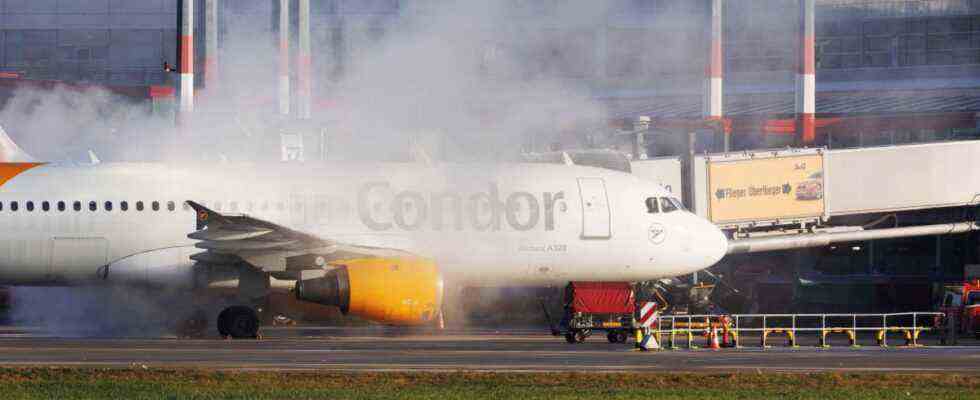The first glance at Condor’s new company headquarters does not bode well. The administration once resided in a rather chic office building in “Gateway Gardens”, where recently many new hotels and office buildings have been built within walking distance of the Frankfurt airport terminal. But the airline has now moved into a hideous concrete bunker in an industrial park on the outskirts of Neu-Isenburg – right between the logistics center of a supermarket chain, a freight forwarder and a spare parts service. The offices are largely deserted due to Corona, and the rapid tests that are also mandatory for visitors are on the table.
Ralf Teckentrup, head of the holiday airline for 18 years now, still does not let his optimism be taken away, neither by the at most functional offices nor by the Omicron wave currently sloshing through the country. “I would make a bet that in the summer we will be at 80 to 90 percent of pre-crisis demand or even higher,” he says. “People want to go on vacation as soon as they can do it with acceptable risks.”
The 64-year-old and his CFO Christoph Debus led Condor through two and a half turbulent years, during which the airline was on the brink of collapse several times. In September 2019, the parent company Thomas Cook collapsed. Condor had to go into a protective shield procedure itself in order to be able to ward off claims by Thomas Cook creditors. The federal government stepped in with a bridging loan. The corona pandemic hit Condor like the entire aviation industry with tremendous force, at times the airline was only able to do a handful of cargo flights with converted ones Boeing 767 to offer. Business was almost at a standstill, and then the planned investor, Polish Aviation Group, jumped off. With the help of another loan from KfW, Condor was able to continue flying. The company finally found the financial investor Attestor, who provided fresh capital, ensured survival and made urgently needed investments in the fleet possible.
And now, after all that and a pretty good summer 2021, Omicron. “The access to new bookings has been very clear since mid-January,” says Teckentrup. “That’s why we cut the program for the second half of January and the whole of February.” Condor flies about 180 short- and medium-haul rotations a month, about 25 to 30 percent of the normal program and half of what Condor itself had forecast in the autumn. The long-haul runs better at 40 to 45 percent of the normal level, but not well either.
Losses are limited in winter and earnings are made in summer
But Teckentrup emphasizes that despite everything, the current wave is not a catastrophe for the company. In winter, the holiday airline is only concerned with limiting losses anyway. The money is earned entirely in the summer. “Anyway, not good business in winter is now less than half as big as we once thought,” says Teckentrup. “But that doesn’t blow our minds.”
But it is much more important that the summer is really going as well as Teckentrup predicted. It’s difficult to predict. Normally, now would be the time when many customers book their summer trips. But in view of the great uncertainty, holidaymakers are still holding back. Teckentrup, however, draws hope from last autumn, which showed that customers’ booking behavior had changed significantly during the pandemic: “The whole of October was sold from the beginning of September to mid-October. There was huge capacity available in tourism and they have all sold very well, also at very good prices.”
The further development of Condor also depends on whether and how it can work with Lufthansa in the future. Lufthansa has been offering feeder flights for Condor long-haul routes in Frankfurt for decades, but no longer wants to do so in the future because it is setting up its own intercontinental holiday airline, Eurowings Discover. Condor complained to the Federal Cartel Office that a final decision could be made in the next few weeks. Because Lufthansa has only temporarily extended the agreement until the end of May, while Discover flies on many Condor routes such as Frankfurt-Anchorage.
No matter how the dispute with Lufthansa ends, Condor is investing heavily
“The goal is to oust the Condor, but that’s ultimately forbidden,” criticizes Teckentrup. This displacement strategy can be proven in many places, including when dealing with Ryanair and Easy-Jet. Even the financially strong Ryanair recently gave up its base in Frankfurt, officially because of rising airport fees, but more likely because Lufthansa aggressively defended its hub. But “Condor enjoys a very good reputation among the organizers and that’s why our partners work very closely with us.”
Whatever the outcome of the dispute, Condor has long since decided to invest billions in a new long-haul fleet. From October 2022, 16 Airbus A330-900 be delivered to the aging Boeing 767 to detach. The airline had put off the project for years because the investments were impossible under the old owner Thomas Cook and then in the protective shield process. But the situation changed with the entry of Attestor, which provided almost half a billion euros in equity and money for investments in July 2021.
According to industry circles, Condor was able to get extremely favorable conditions from Airbus because the A330 Like all long-haul aircraft, it is currently selling poorly, so the manufacturers are willing to make larger concessions.
If the current schedule stays the same, Teckentrup will no longer complete the fleet project itself. In December 2021 he had extended his contract by another two years, also because CFO Debus absolutely wanted to do something new elsewhere and did not want to become his successor. After all the dramas that have been survived, Condor is faced with the next big problem: who should replace Teckentrup?

